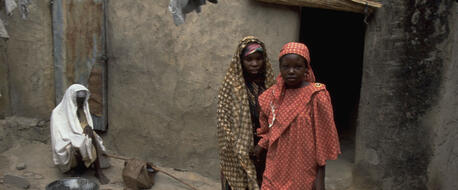
Merck & UNICEF USA’s Partnership: Fighting River Blindness and Maternal Mortality
Partner since 1991
The pharmceutical company Merck has supported UNICEF's work since 1991, through in-kind product donations, workplace-giving campaigns and employee matching gifts.

Fighting River Blindness
Merck is one of UNICEF USA's largest in-kind supporters through its donation of Mectizan—a drug used to fight river blindness (onchocerciasis). The condition is one of a group of neglected tropical diseases that continue to affect the world's most improverished communities. River blindness begins with a parasitic infection that can lead to loss of sight — with severe economic and social consequences.
The best way to prevent river blindness is to avoid being bitten by black flies. Another is to proactively treat everyone in a community with Mectizan, to disrupt the life cycle of the parasite.
Merck, the developer and manufacturer of the drug, works with UNICEF and other organizations to distribute it free of charge to all who need it. The Mectizan Donation Program has shipped more than 4 billion 3 milligram pills to endemic countries since its inception in 1987.
After decades of successful implementation of elimination activities, several countries have been verified as river blindness-free by the World Health Organization, including Colombia (2013), Ecuador (2014), Mexico (2015) and Guatemala (2016). Today, the disease remains endemic primarily in Nigeria, where between April 2020 and March 2021, more than 32 million people in 12 Nigerian states received treatment for river blindness, representing a therapeutic coverage rate of 70 percent and geographic coverage rate of 92 percent.
Improving maternal health in South Africa
In June 2013, Merck committed nearly $500,000 toward UNICEF's efforts to improve the quality of health care for mothers and children in South Africa through its Merck for Mothers initiative. The support focused on UNICEF and government-led efforts to advance low-cost, high-impact solutions to some of the leading causes of maternal death, including HIV and tuberculosis, and to ensure quality care during pregnancy, labor and delivery. South Africa's maternal mortality rate is an estimated 10 times what it should be given the country's level of economic development and healthcare spending.
With the support from Merck for Mothers, UNICEF also piloted an SMS-based mobile platform that allows community members to provide real-time feedback on their health care experiences so that health facilities may improve accountability and better serve their patients.
Top photo: A young girl guides her mother, who lost her sight from river blindness, through an alleyway outside their home in Kaduna, Nigeria. Merck is one of UNICEF USA's largest in-kind supporters through its donation of Mectizan—a drug used to fight the disease caused by a parasitic infection. The program has helped eliminate river blindness is several countries in recent years. © UNICEF/UNI33645/Pirozzi